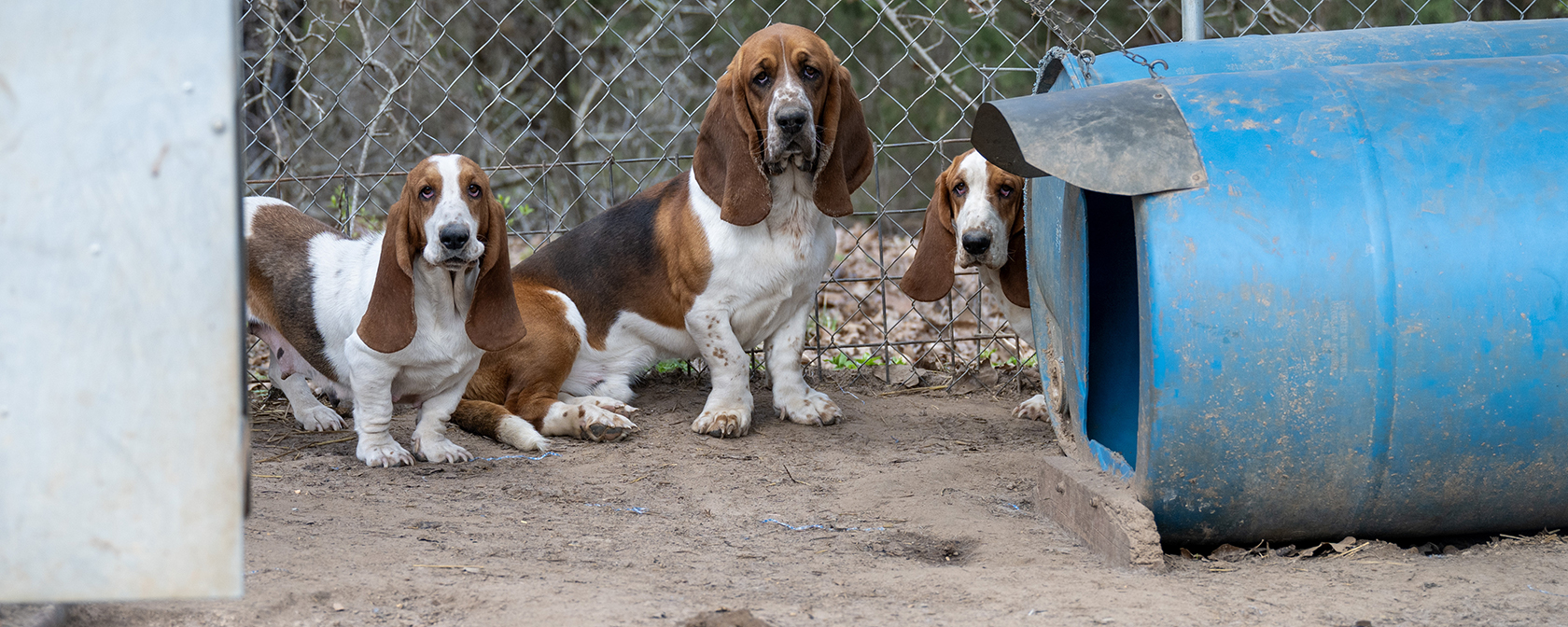By Sara Amundson and Kitty Block
Since we first started publishing our Horrible Hundred report on problem puppy mills in 2013, at least 2,500 animals have been rescued from these bad breeders, and more than 250 puppy mills from our reports have closed. This year, our Horrible Hundred report, released this past April, generated more than 100 news and broadcast media stories about the current state of puppy mills in the U.S. News coverage is one of the ways we alert the public about the reality of puppy mills and encourage enforcement agencies to act.
Our 2024 report highlighted the fact that some breeders hide behind certain credentials to create the perception of legitimacy. But the fact that a facility is affiliated with the American Kennel Club or licensed and inspected by the U.S. Department of Agriculture means very little for the dogs who are languishing there. Even with licenses and affiliations, massive commercial breeders can still be inhumane; unfortunately, many stay in business despite having numerous violations of the Animal Welfare Act on their records for issues such as filthy conditions, inadequate veterinary care, lack of water or shade, or sick and injured dogs. Even when commercial dog breeding facilities are licensed and regulated by both federal and state agriculture departments, they can still fail to meet even minimum animal welfare requirements for the respective licenses, and the dogs suffer.
Since the report was published, we’ve seen significant progress. At least 15 Horrible Hundred breeders from our recent or prior reports have closed or canceled their licenses. Here are some highlights of this positive momentum for dogs:
- In Oklahoma, the USDA entered into a consent decree with Angela Weaver/Arrow Wind Kennels, who had continued to violate the Animal Welfare Act despite the USDA’s repeated citations. Weaver was fined $5,000, and her USDA license was canceled. Most of her dogs were relinquished and sent to rescues.
- Lotta Spots Ranch, a formerly state-licensed breeder in New York, which appeared in three recent Horrible Hundred reports and failed 20 state inspections, appears to have stopped selling puppies and is no longer licensed.
- The USDA filed a legal complaint against Mary Moore/D&M Kennel of Kansas this year, even after her license was cancelled in 2023, for the violations she incurred while licensed. This shows a commitment on the part of the agency to hold breeders accountable for repeatedly violating the Animal Welfare Act, even after they have dropped their licenses. Mary Moore’s license is now permanently revoked after the USDA issued a Consent Decision and Order, which will prevent her from obtaining a new USDA license in the future.
While many puppy mills have closed, others that have been in our Horrible Hundred report six, seven or even more times remain in business despite recurring animal care violations. Even more troubling is that some states, perhaps in an attempt to avoid exposure in our report, have been declining to fulfill our public records requests, in apparent violation of their own states’ right-to-know laws. For example, Wisconsin has delayed our public records requests for several years. This year, Wisconsin’s Department of Agriculture, Trade and Consumer Protection charged us almost $400 in March for processing our request for records, but over six months later, we still have not received the records. Despite this lack of cooperation from the state, the state still had more breeders in this year’s report than it ever has before (10), based solely on records we obtained from the USDA. Other states that have failed to provide records in a thorough or timely manner include Oklahoma, Illinois and Indiana.
A director from our Stop Puppy Mills team recently spoke with Wisconsin Public Radio about the state’s failure to share kennel records. The lack of transparency is troubling, especially for Wisconsinites who want to know if their tax dollars are being used effectively to combat animal cruelty. Hiding records is not the way to answer a state’s puppy mill problem. Instead of covering up such cruelties, more transparency and better enforcement of animal welfare regulations will do justice to animals in breeding facilities and to the people who care about them.
We are devoted to doing everything possible to continue to expose puppy mills in states all across the U.S. But we can’t do it without your help and support: If you or someone you know purchased a sick puppy from a pet store or puppy mill, report the incident to us. If you believe you have a puppy mill in your community, contact us about it. If your representative is not currently co-sponsoring the Puppy Protection Act (H.R. 1624), contact them and ask them to help protect puppy mill dogs.
Together, we can shape a world in which mother and father dogs aren’t treated as mere breeding machines and their puppies instrumentalized as products for raking in profit.
Kitty Block is CEO of the Humane Society of the United States.




